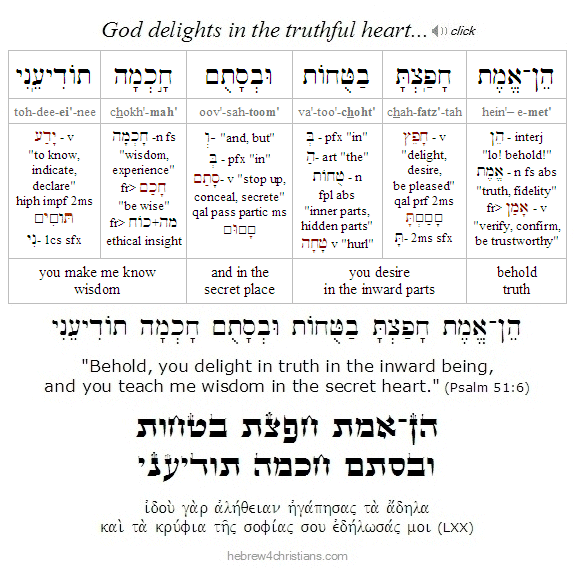|
Why does God want us to face the truth about death? Why does Moses ask God to teach us to "number of our days?" (Psalm 90:12). The reason is that by nature people deny the reality of death - they hide their eyes from it, ignore it, and pretend it's not there - so they can continue to live under the illusion that they are in control of their lives, that they are the center, that they are immortal little "gods." Death threatens the ego and humbles us to confess the truth about life, namely that we are not in control, that we cannot choose to be immortals, that we do not have power to exist in ourselves, and therefore we need life from a radically different source - spiritual life - wherein we receive a new identity and a new being found in relationship with God.
The "natural man" regards death as an offense or as "absurd" because it splits us in two, creating a "divided house" that cannot stand. The ego demands to be god-like, important, valued as sacred, etc., yet the prospect of death crushes the aspiration and yields alienation from reality. This creates a painful tension or dualism within the heart where the meaning and purpose of life is lost.... The message of the gospel begins precisely there, however, speaking to broken people who thirst for life but find themselves living on "death row" - people who are humbled and who understand they cannot heal themselves from the "sickness unto death," as Kierkegaard used the term. The remedy is not to deny death or to live as if death is not a genuine horror, but to understand it as our natural estate, brought about by sin that exalts the ego over the God who made us.
The power of the gospel is to partake in a new source of life and to be healed from the sickness of death by God's miracle in Messiah (2 Cor. 5:17). "Jesus saves" is not a cliché for the faith but the sober truth of reality. It is by our union or identification with Him, by the agency of the Holy Spirit, that we are imparted new existence, true spiritual being, that is not subject to the natural law of sin and death (Col. 3:9-11). Being "in Messiah" means you are "justified," that is, welcomed, affirmed, accepted and declared righteous by God, and that you are set free from the condition of "being unto death." You partake and share in the life (relationship) of God based on his redeeming love: you are "adopted" by God, made a member of his "household," and attain the inheritance of which is eternal life. Consequently you cry out "Abba, Father" to God who watches over you and leads you through the days of your sojourn here on earth (Rom. 3:32). Despite walking through the shadowy byways and tribulations of this world, you refuse to let death define you or be the last word: you trust that your Father is with you, working all things for your ultimate good (Rom. 8:28). You know who you are, where you are going, and what your end is because of Yeshua our Lord.
Facing death is essential because the message of the gospel must be grounded and framed in the language of our wretched desperation as lost souls in this world (Rom. 7:24). Death is the central problem of existence, and death is therefore serves as the "propaedeutic" that leads us to the salvation found in Yeshua the Messiah...
The dualism of life shows up within our hearts as well, as we wrestle with our own faith and with "double-mindedness," that is, the ambivalence that results from not having our minds entirely made up. On the one hand, we need to confess the truth of our radical sinfulness, our depravity, our brokenness, our legacy from Adam, and so on, while on the other we must learn to know ourselves as the "beloved" and to find faith that God's blessing indeed belongs to us -- that Yeshua now represents us and gave his life for us -- despite ourselves. We have to be willing to take God's new name for us and believe that God has transformed our ultimate nature for eternal good. We have to be renamed from "Jacob" to "Israel," even as we yet know ourselves as both... In other words, we must learn to "put on" the new nature and to "put off" the carnal reasoning of our former life. The answer for us is found in the word "miracle," as God in great mercy and compassion regenerates us, comforts us, and then guides our way back to the truth of his salvation.
◊Ē÷Ķ◊ü÷ĺ◊ź÷Ī◊ě÷∂◊™ ◊ó÷ł◊§÷∑◊¶÷į◊™÷ľ÷ł ◊Ď÷∑◊ė÷ľ÷Ľ◊ó◊ē÷Ļ◊™
◊ē÷ľ◊Ď÷į◊°÷ł◊™÷Ľ◊Ě ◊ó÷ł◊õ÷į◊ě÷ł◊Ē ◊™◊ē÷Ļ◊ď÷ī◊ô◊Ę÷Ķ◊†÷ī◊ô
hen · e·met · cha·fatz·ta · va·tu·chot
uv·sa·tum · chokh·mah · to·di·ei·ni

"Behold, you delight in truth in the inward being,
and you will teach me wisdom in the secret heart"
(Psalm 51:6)

Note: For further reading on this subject, see the following books: "The Sickness unto Death" and "The Concept of Anxiety" by Soren Kierkegaard; "The Denial of Death" and "Escape from Evil" by Ernest Becker; "Irrational Man" by William Barrett; "Existential Psychotherapy" and "Staring at the Sun" by Irving Yalom; "Is Life Worth living?" by William James; "Man's Search for Meaning" by Victor Frankl; "Being and Time" by Martin Heidegger; "Death in the City" by Francis Schaeffer; "Remember Death" by Matthew McCullough; "The Death of Death" by John Owen; "Gravity and Grace" by Simone Weil; "The Problem of Pain" by C.S. Lewis; "The Art of Dying" by Rob Moll; "Struck" by Ramsey Russ; among others.
See also:
|


